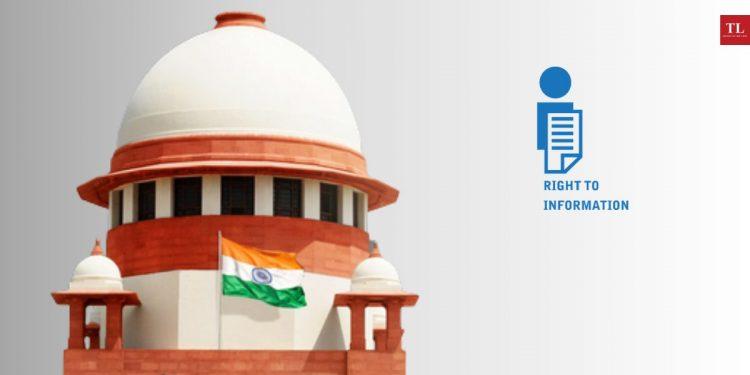Fifteen RTI Information Commissioners Write to CJI, Urge Action Against Courts Staying Orders of Information Commissioners

In a letter dated September 9, 2021 by a group of 15 sitting and retired information commissioners addressed to the Chief Justice of India N.V. Ramana, the problem of high courts staying the orders of Information Commissioners has been highlighted, and the Supreme Court has been urged to take action on the same.
In the letter, the information commissioners requested that directions be given to courts across the country to not entertain pleas against the orders passed by the Central Information Commission (CIC) or State Information Commissions (SICs).
The CIC is a statutory body established under the Right to Information (RTI) Act, 2005 to act upon complaints made against Central Public Information Officers who refuse to accept RTI applications, or for cases where no officer is available to respond to RTI applications.
At the state level, the SIC is the analogous agency that has the power to receive complaints and take action against public information officers.
The information commissioners have written that orders passed by them are being stayed by several High Courts, with no due reasons being given for the same. Referring to Section 23 of the RTI Act, the letter noted that the provisions of the statute clearly indicates that the right of final appeal lies with the Information Commissions themselves, and not with the courts.
The letter also invoked certain landmark case-precedents and Article 226(3) of the Constitution to direct high courts to dispose of the applications made for stay in the absence of the information commissioners.
“Article 226 (3) of the constitution clearly lays down that where a stay has been obtained without the participation of the respondents, the High Court shall dispose of the application within a period of two weeks from the date on which the petition for vacation of the stay is made. If this is not done, the stay stands vacated. This is not being implemented across the nation”, wrote the information commissioners.
Signatories to the letter include Rahul Singh and G. Krishnamurthy, two sitting State Information Commissioners from Madhya Pradesh. Other signatories include retired Chief Central Information Commissioner Satyananda Mishra , and four retired Central Information Commissioners (CICs).
The full text of the letter is produced below:
To
Honourable Justice N.V. Ramana,
Chief Justice of India
Tilak Marg, Mandi House, New Delhi, Delhi 110001
9 September 2021
Subject: Writ jurisdiction of High Courts in RTI matters
Dear Sir,
The undersigned are present and former Information Commissioners. We respectfully wish to draw your attention to a practise of grant of stay to orders by the Commissions. According to Section 23 of the Right to Information (RTI) Act, 2005, “No court shall entertain any suit, application or other proceedings in respect of any order made under this act and no such order shall be called in question otherwise than by way of an appeal under this act.”
Thus parliament clearly intended that the final appeal will lie with the Information Commissions.
Many High Courts stay orders of Information Commissioners where no reasons are given either in the petition or in the orders describing how the challenge would fall under the writ jurisdiction of the Court. These cover orders ordering disclosure of information as well as imposition of penalty.
In the case of Surya Dev Rai vs. Ram Chander Rai and ors. ((2003) 6 SCC 675), the Supreme Court made the following observations regarding the powers of certiorari under Article 226 of the Constitution:-
“Certiorari, under Article 226 of the Constitution, is issued for correcting gross errors of jurisdiction i.e. when a subordinate court is found to have acted (i) without jurisdiction – by assuming jurisdiction where there exists none, or (ii) in excess of its jurisdiction – by overstepping or crossing the limits of jurisdiction, or (iii) acting in flagrant disregard of law or the rules of procedure or acting in violation of principles of natural justice where there is no procedure specified, and thereby occasioning failure of justice.”
This was reiteration of a similar pronouncement made by the Court in Hari Vishnu Kamath vs. Ahmed Ishaque (1955-IS 1104 : ((S) AIR 1955 SC 233). We would like to point out that a significant number of stays do not fall in the writ jurisdiction of High Courts and are appeals labelled as writs. It is submitted that after staying the statutory order of the Information Commission, most cases languish and citizen’s fundamental right under Article 19 (1)(a) is violated. It appears that parliament was conscious of this and hence proscribed further appeals after the Commission.
There is another aspect which we would respectfully like to bring to your attention. Article 226 (3) of the constitution clearly lays down that where a stay has been obtained without the participation of the respondents, the High Court shall dispose of the application within a
period of two weeks from the date on which the petition for vacation of the stay is made. If this is not done, the stay stands vacated. This is not being implemented across the nation. We request the apex court to reiterate this point.
We must remember that the Provisional Parliament had contentious debates for sixteen days before accepting any constrictions of the fundamental right under Article 19 (1)(a). The house which constituted members of our Constituent Assembly was very wary about imposing conditions and agreed to Article 19 (2) with great reluctance.
We request you to please consider treating this as a suo moto PIL and issuing appropriate directions to make RTI effective in line with the Constitution and the law passed by Parliament. You may please consider directing courts to give reasons how the challenge falls in the writ jurisdiction of the High Courts. At the very least orders of imposition of penalty should not be stayed as no irrevocable harm can come to the penalised official. It should also be ensured that if any stay order is given it should give reasons for staying the statutory order of the Commission. In case the penalty order is quashed the amount can be refunded by the exchequer. They should also give effect to Article 226 (3) when dealing with petitions asking for a stay order against Information Commission’s decisions.
Thanking you in anticipation,
- Shailesh Gandhi
Retd Central Information Commissioner - Rahul Singh
Madhya Pradesh State Information Commissioner - Sridhar Acharyulu
Retd Central Information Commissioner Retd - Ratnakar Gaikwad
Maharashtra State Chief Information Commissioner - Satyanananda Mishra
Retd Chief Central Information Commissioner Retd - Prof. MM Ansari
Central Information Commissioner - L. Krishnamurthy
Retd Karnataka State Information Commissioner Retd - Yashovardhan Azad
Central Information Commissioner - Atmadeep
Retd MP State Information Commissioner MP - G. Krishnamurthy
State Information Commissioner - Smt. Thanksy Francis Thekkekara
Retd Maharashtra State Information Commissioner Retd - Ajit Kumar Jain
Maharashtra State Information Commissioner - Vijay Kuvalekar
Retd. Maharashtra Information Commissioner Retd - Sambhaji M. Sarkunde
Maharashtra State Information Commissioner - Dr. Suresh Joshi
Retd Maharashtra State Chief Information Commissioner
Get the latest reports & analysis with people's perspective on Protests, movements & deep analytical videos, discussions of the current affairs in your Telegram app. Subscribe to NewsClick's Telegram channel & get Real-Time updates on stories, as they get published on our website.
























